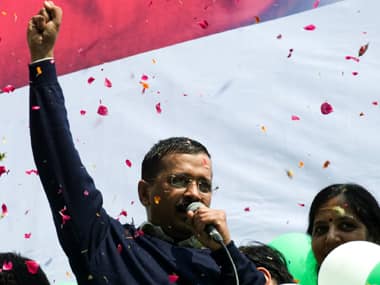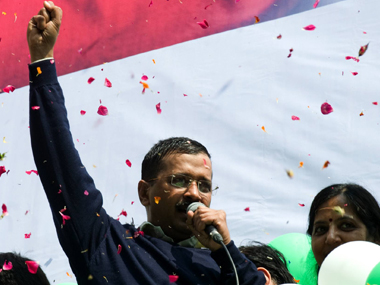The new “sting” against Arvind Kejriwal, clearly part of an organised campaign to discredit his leadership and the AAP, is a “no-sting” because there is nothing in it. It’s a blank fired from an empty gun and all that it will lead to will be some flash and smoke. According to the purported “sting”, published by the Indian Express on Monday, Arvind Kejriwal is heard speaking to the members of the minority cell of AAP. Reportedly, the minority cell leader demanded 11 seats for Muslims in the Delhi assembly elections which Kejriwal refused to accede to. According to him, seven seats that had been allocated to Muslims were enough and any more would look made up. It would lead to polarisation and the BJP would win. He is also heard saying that only AAP could stop the BJP and the Muslims were watching. “The 7 muslim seats that are there, if you put Muslims there, it will get polarised… BJP will win…If you are thinking that 11 seats Muslims should get, numbers should be made up… Muslims are watching that if there is anyone who can stop the Modi rath, then it is the AAP than can do it, that is the biggest hope in front of them. What is the first priority… nobody can stop Modi’s rath, one after the another they are forming governments…” the report quotes the voice, purportedly that of Kejriwal. Has Kejriwal done anything wrong here? No, in fact, he should be credited for the fact that he was not playing into the hands of either the Muslims or the Hindus even while being mindful that the former were watching the rise of the BJP with some anxiety. From the leaked conversation, it appears that the minority wing wanted to play up the Muslim card, but Kejriwal was standing his ground. Frankly, the statement by Irfanullah Khan, head of the AAP minority wing, who has been quoted in the report that “the point of this recording is that even Arvind Kejriwal disregards the feelings of Muslims, just like any other leader does” doesn’t make sense because Kejriwal appears to have seized of the need to protect minority interests, the threat of a BJP-tide and the need for a proactive role by AAP, without overplaying the Muslim card. It’s a strategy that is prudent, secular and non-exploitative. [caption id=“attachment_2101051” align=“alignleft” width=“380”]  From the leaked conversation, it appears that the minority wing wanted to play up the Muslim card, but Kejriwal was standing his ground.[/caption] However, these stings - apparently there will be more - do a different type of harm because it dents the image of AAP as an embodiment of clean politics. More over, AAP held forth a political philosophy that Kejriwal and others said was steeped in democratic principles - participative, inclusive, bottom up and transparent. The leaders also insisted that they were in it for public service and not to reap the benefits of power. There were indeed many examples, including that of Kejriwal, that spoke of personal sacrifices and shining voluntarism. However, what the “stings” reveal is that the AAP, despite the apparent bright spots, too has been blighted by political careerists, opportunists, power brokers and even communalists. That the two “stings’ which made into the media have been recorded/released by former candidates, who had been denied tickets this time, blunts the lofty claims of the AAP. In fact, it’s the same careerist disgruntlement that led to mudslinging by people such as Kumar Binny and Shazia Ilmi. That both of them found safe homes in the BJP too soon also exposed the emptiness of the clean politics rhetoric in AAP. Many of the members appear short-sighted, when it comes to positions of power such as party-tickets and designations. In addition, the alleged disruptive steps by leaders such as Prashant Bhushan and Yogendra Yadav point to indiscipline, lack of trust and transparency, clash of ideologies and inner party democracy. Had there been true inner party democracy and discipline, the bickering by the Bhushan-Yadav duo wouldn’t have become public. It may be suspected that, after reaping the benefits of a grand promise, Kejriwal has become a conventional leader who leads a conventional party of lobbies, factions and personal ambitions. For the time being, everything related to the AAP runs the risk of noise of altered reality. Kejriwal and his alleged coterie are viewed with suspicion. In a year of existence, it has generated more disgruntled elements than the BJP and the Congress would have done in its first year. In its quest for rapid rise to power, perhaps encouraged by the 28 seats in 2013, AAP has apparently compromised on its principles and is paying the price now. Instead of a party of idealists and change-makers, it has turned out to be an assortment elements that make Indian political parties. As a wise man had once said, absolute power certainly attracts the corruptible. But that’s the inherent nature of power and one doesn’t need to be so critical and negative, but be realistic about his/her expectations. French post-modernist Michel Foucault makes it easier for us: ’We must cease once and for all to describe the effects of power in negative terms: it ‘excludes’, it ‘represses’, it ‘censors’, it ‘abstracts’, it ‘masks’, it ‘conceals’. In fact power produces; it produces reality; it produces domains of objects and rituals of truth.” Therefore, on a positive note, the churning in the AAP is has produced a “reality, domains of objects and rituals of truth”.
From the leaked conversation, it appears that the minority wing wanted to play up the Muslim card, but Kejriwal was standing his ground.
Advertisement
End of Article


)
)
)
)
)
)
)
)
)



